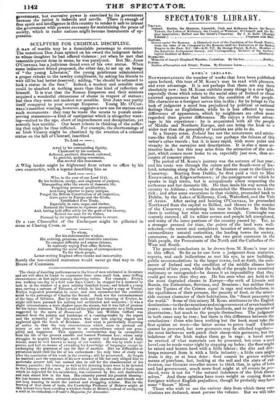SCULPTURE FOR CRIMINAL DISCIPLINE.
A man of marble may be a formidable personage to encounter. The notorious Don Juan spitted on his sword the indignant father to whose daughter he had offered violence : yet when he met that venerable parent dons in stone, he was paralyzed. But Mr. Joatv O'CoBnuta, has a judicious dread even of his own statue. When some indiscreet friend proposed, the other day, to set up an image of "the young Liberator," the young gentleman administered proper rebuke to the tawdry compliment, by asking his friends to wait till he had better deserved ; adding, "he should be ashamed to look a statue in the face." Indeed, a modest and sensible man could be abashed at nothing more than that kind of reflection of himeelf. It is true that the Roman Emperors and their minions acquired a wonderful obtuseness of shame in respect of statues; but then they were not modest nor sensible. Don Juan was purity itself compared to your average Emperor. Young Mr. 0 Con- s:am:a manifest wincing, however, suggests a new use for statues and such monuments : they may be made the means to punish unde- serving statesmen—a. kind of castigation which is altogether want- ing—suited to the age, short of impeachment and decapitation, yet scarcely less terrible. Our heart relents in thinking of the suffer- ing that might be thus inflicted. For example, the shortcomings of an Irish Viceroy might be chastised by the erection of a colossal statue on the hill of Clouted, inscribed To Lord — —; Ireland, Awed by his commanding dignity, Chastened by his counsels, Softened, penitent, disarmed, endeared, In grateful, undying veneration, Has erected this monument.
A Whig leader might be frightened from return to office by his own counterfeit, with a legend describing him as Lord — —;
Who, in the year of our Lord 1841, By his boldness, energy, and singleness of purpose, Disregarding alike the sweets of domestic life, Forgetting personal predilections, And rising superior to party intrigue, Purged the British Constitution of all impurities, Gave peace to Europe and the Globe, Established Free Trade, Especially in corn, sugar, and timber, Restored the finances to vigorous prosperity, And, having held office solely for the good of his country, Retired too soon for its wishes, Pursued by its regretful importunities to return.
Or a vast Chancellor of the Exchequer might be pilloried in stone at Charing Cross, as
To whom, For his statesmanlike wisdom, His untiring, generous, and irresistible exertions To conquer difficulty and expose chicane, In zealously urging Post-office Reform, And extending the social blessings of correspondence To the whole people, Letter-writing England offers thanks and immortality.
Surely the too-exalted statesman would never go that way to the House of Commons.


























 Previous page
Previous page